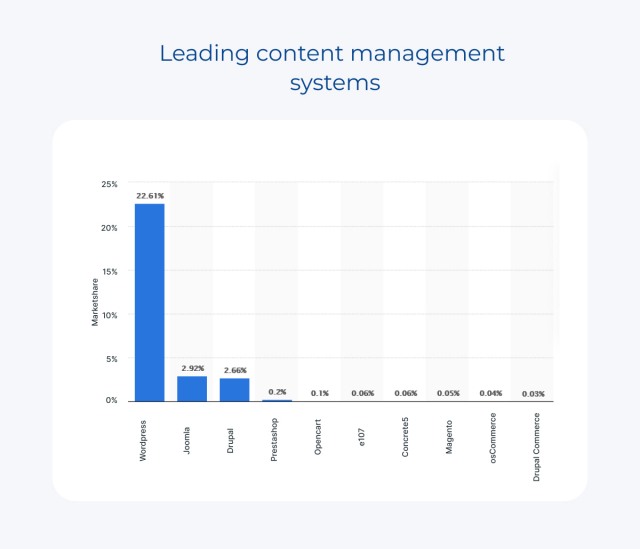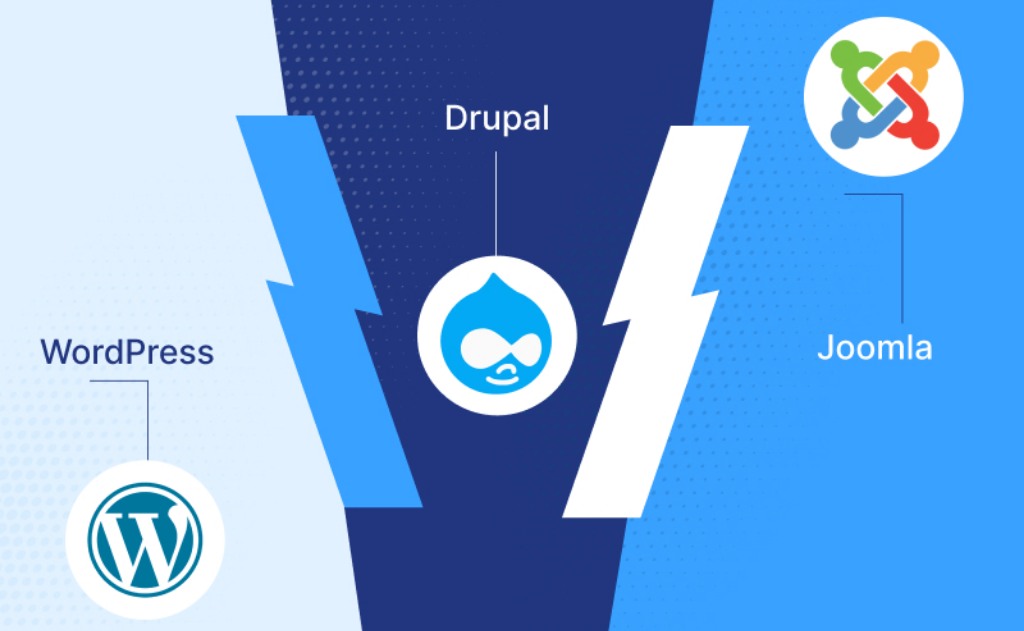Every website or business needs the right platform to reach the masses and stay competitive in today’s market. A CMS allows you to create dynamic, database-driven websites without knowing much about HTML or any other coding language.
Content management systems (CMSs) are programs designed to make it easy for users to manage and maintain websites. CMSs have been around for decades and have made managing sites easier for developers and site owners by minimizing development time and ensuring reliability.
There are many different CMSs with additional capabilities; today, however, three significant platforms reign supreme. WordPress vs. Drupal vs. Joomla: These are the three most popular content management systems (CMS) today.
Although all three offer similar functionality, there are significant differences between them that you should consider before choosing one over the others. Selecting one of these platforms can seem daunting if you don’t know what you’re looking at.
Each system has many moving parts that can give prospective site owners headaches when they begin to consider which option is best.
This guide will help you understand which platform might be right for your needs by comparing WordPress vs. Drupal vs. Joomla. It will also offer tips on choosing the best venue in 2022 and beyond.
The infographic table offers insights into choosing between these three.
Comparison Table: WordPress vs. Drupal vs. Joomla
Parameters of Comparison | WordPress | Drupal | Joomla |
Year of Release | 2003 | 2001 | 2005 |
Ease of Use | Simple learning curve | Steep learning curve | Moderate learning curve |
Running Space Required | 60 MB | 32 MB | 256 MB |
Multilingual Capabilities | Plugins available | Integrated into the main CMS. | Integrated into the main CMS. |
Top Features |
|
|
|
Popularity | As per Statista, the popularity stands at 22.61%. | As per Statista, the popularity stands at 2.66%. | As per Statista, the popularity stands at 2.92%. |
Number of Themes on the Official Website | 9000+ | 2040+ | 8500+ |
Customization Options | 50K+ Plugins | 48K+ Modules | 6K+ Extensions |
Top Companies Using it |
|
|
|
I hope the above table gives you a clear idea of the best option when choosing the best CMS. Let’s dive into the detailed comparison of these CMs options without any hither and thither.
WordPress vs. Drupal vs. Joomla: Analyzing the Basic Use & Functionalities
WordPress
It can be used for many different things. It’s not just a blogging platform, but developers can also use it to create a portfolio site or an e-commerce website. The best part about WP is that you don’t need any programming skills to use it.
Overall, WordPress is easy to set up and use without programming experience. You can install free and premium themes to get your site looking like you want. Of course, there are plugins for things like social media integration and e-commerce that aren’t necessary for basic templates, but if you want something, you will likely find a plugin for it.
Drupal
It’s not just for creating websites. You can connect with a Drupal development company to develop mobile apps, dynamic e-commerce storefronts, and even blogs. One of Drupal’s best features is its versatility. And its flexibility allows you to do whatever you need on your site.
As a content management system (CMS), it can be used for publishing to digital marketing. It’s also an open-source platform which means it’s free to download and comes with tons of plugins and add-ons that make building a complex site much more accessible than many other platforms.
Joomla
When it comes to building complex web applications or websites with many different functionalities and features, a platform like WordPress may not be sufficient for all your needs. For example, many professional news or magazine sites use Joomla to secure their data by locking down content and allowing only registered users to edit pages.
With an easy-to-use interface, seamless database connectivity, and security plugins available from its official site, Joomla has become one of the most popular open-source platforms today. It makes sense that it would be around in 2022 as well.
WordPress vs. Drupal vs. Joomla: Features Offered by the CMS
Top features of WordPress
- Efficiently manages the website content.
- Zero Limits on the number of pages, posts, products, & more.
- Allows integration of news & blog posting.
- Offer flexible post schedules.
- Restores deleted pages.
- It provides rollback versioning.
- Website portability & free of vendor lock-ins.
- Easily integrates website editors.
- High website security.
Top features of Drupal
- It offers high versatility.
- It ensures excellent mobile experiences.
- Great multilingual support.
- It provides platform independence.
- Powerful taxonomy & menu structures.
- Workflow & content moderation.
Top features of Joomla
- It is a widely supported open source multilingual CMS platform in the world.
- Good community support.
- It offers regular updates.
- Integrated support system.
- It provides banner management.
- It comes with a dedicated media manager.
WordPress vs. Drupal vs. Joomla: Which One is the Most Popular?

WordPress, Drupal, and Joomla are some of the most popular and widely used content management systems. However, it isn’t straightforward to tell which one is more popular among these three. The main reason behind all these confusions is that each has its specialties.
However, as per research, the answer is WordPress.
As per W3Tech, the popularity stands as follows:
- WordPress: 64.5%
- Drupal: 2.5%
- Joomla: 1.9%
As per Statista, the popularity stands as follows:
- WordPress: 22.61%
- Drupal: 2.66%
- Joomla: 2.92%
WordPress vs. Drupal vs. Joomla: Availability of Themes
Theme selection has been a critical differentiator among these three content management systems (CMS) over time and one that continues to give WordPress an edge over its competitors. You can make your site about whatever you want it to be: a t-shirt company, a news site, or even something particular like an e-commerce site for pet food.
You can have tons of customization and try multiple website perspectives with different themes. The high availability of themes ensures better help. It also makes your website more secure and faster.
It is a significant factor for a site that has to be updated regularly. Also, many popular CMSs like WordPress offer free installation services so that you don’t have to face any difficulties while setting up your site on their platform.
Themes are available, but they are also much easier to use compared to other platforms where coding knowledge or special software is required for them to be used by non-technical people. Also, many sites provide free themes so that users do not have to pay anything extra for them.
WordPress: 9000+ themes on the official website.
Drupal: 2040+ themes on the official website.
Joomla: 8500+ themes on the official website.
WordPress vs. Drupal vs. Joomla: Customization Options
All three platforms offer a variety of ways to customize your website. You can change font sizes, colors, and layouts with WordPress and Joomla by using themes and templates. Drupal also has its theme engine, allowing you to adjust your site’s elements more specifically. As for customization beyond layout, that’s where each platform starts to differ.
For example, WordPress doesn’t have modules as Drupal does, so if you wanted a specific functionality, you would have to find a theme that offers it or customize your theme yourself. Thus, doing so could be complicated even for someone who has some coding knowledge.
However, WordPress offers plugins for high-end customization, and Joomla offers extensions.
WordPress: 50K+ Plugins in the official directory
Drupal: 48+ Modules in the official directory
Joomla: 6K+ Extensions in the official directory
WordPress, Drupal, and Joomla are three of the most popular content management systems (CMS) used today to power millions of websites. There are multiple reasons to choose a CMS:
- It should be user-friendly or developer-friendly.
- It must come with robust features and capabilities out of the box or have advanced functionality you can add later on.
- It may integrate seamlessly with other platforms or allow you to edit your website using simple drag-and-drop tools.
However, no single CMS fits every need, so knowing what to look for when choosing a platform is essential.
Here are 6 Tips for Selecting an Appropriate CMS Solution
1. The breadth of Features
You should always consider how much functionality you need from your CMS. If you’re starting and don’t have a lot of content to manage, then a basic CMS may be sufficient. But if you plan to launch an e-commerce site or have lots of multimedia content on your website, then a more robust platform will be necessary.
2. Cost
Using a particular CMS can vary significantly depending on what kind of hosting and support options are available. For example, WordPress offers free software downloads, and many hosting providers offer one-click installation with WordPress pre-installed.
3. Design Flexibility
When choosing a CMS, it’s essential to consider how much flexibility you need. If you plan to redesign your website in the future or want to change themes frequently, then a platform that offers more flexibility may be best. However, if you’re looking for something simple and easy to use right out of the box, a more rigid CMS may better suit your needs.
4. Multi-site Management
If you manage multiple websites or plan to launch additional sites in the future, a CMS that offers multi-site management capabilities will be beneficial. Many CMS platforms provide tools that make it easy to manage multiple websites from one place. For example, WordPress has network installation options, and Drupal allows you to set up different sites on a single server.
5. Third-Party Integration
Some CMS platforms have robust APIs that allow you to integrate third-party apps and services with your website. For example, WordPress has a large developer community and an open plugin directory where you can find plugins for various services. WordPress Website Development India
Some of these are free, while the rest are chargeable. If you plan to integrate with third-party apps or services in the future, it’s essential to choose a CMS that lets you do so quickly.
6. Security and Support
The security of your website is essential. If you plan to launch an e-commerce site or have sensitive data on your website, choosing a robust security platform is necessary. It’s critical to choose a CMS that offers solid security features.
You should also consider how much support you need from your CMS provider. If you run into issues with your website or need help setting up third-party integrations, having access to support will be helpful.
Over to You
WordPress has fantastic performance in content management system history and more than 100 million websites worldwide. Thus, building a website or app with WordPress proves its credibility.
Moreover, it’s secured from external and internal attacks that cause security threats. It has become an irreplaceable CMS platform. Apart from that, you can build a website with a free website builder, and you have a free website. If you want to get a top-class website or web app, then you should take bits of help from WordPress experts.
